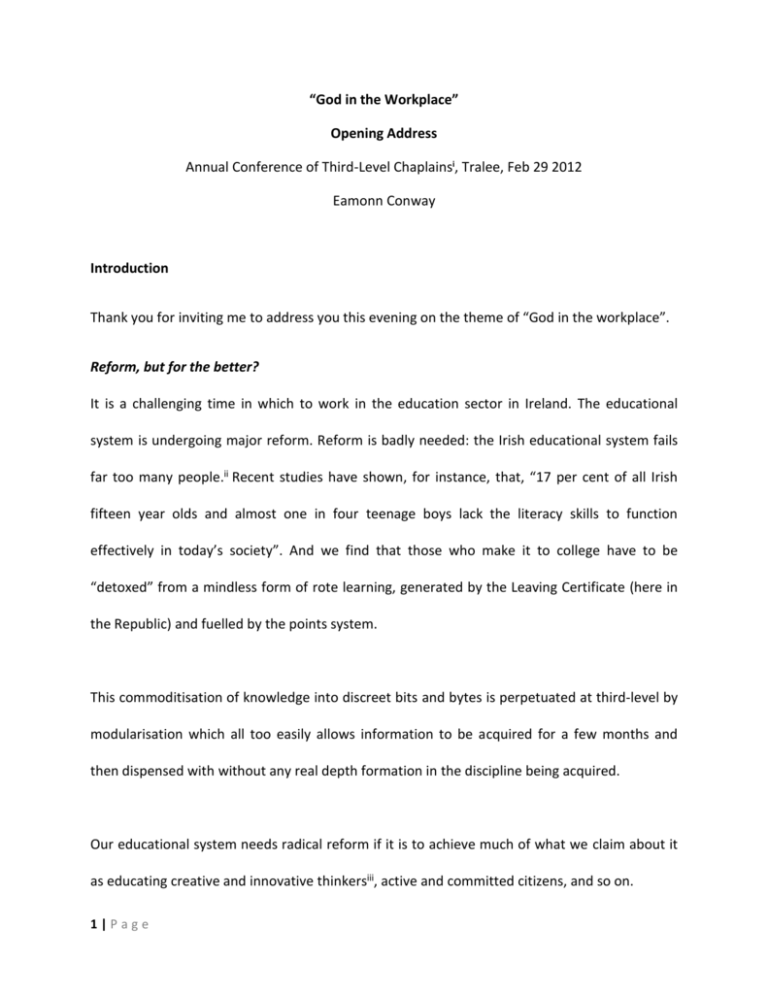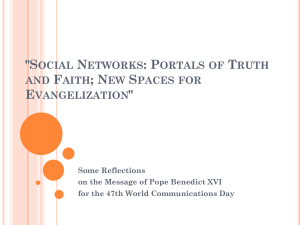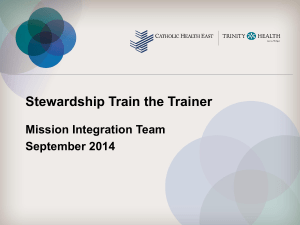God in the Workplace - Annual Conference of Third Level Chaplains.
advertisement

“God in the Workplace” Opening Address Annual Conference of Third-Level Chaplainsi, Tralee, Feb 29 2012 Eamonn Conway Introduction Thank you for inviting me to address you this evening on the theme of “God in the workplace”. Reform, but for the better? It is a challenging time in which to work in the education sector in Ireland. The educational system is undergoing major reform. Reform is badly needed: the Irish educational system fails far too many people.ii Recent studies have shown, for instance, that, “17 per cent of all Irish fifteen year olds and almost one in four teenage boys lack the literacy skills to function effectively in today’s society”. And we find that those who make it to college have to be “detoxed” from a mindless form of rote learning, generated by the Leaving Certificate (here in the Republic) and fuelled by the points system. This commoditisation of knowledge into discreet bits and bytes is perpetuated at third-level by modularisation which all too easily allows information to be acquired for a few months and then dispensed with without any real depth formation in the discipline being acquired. Our educational system needs radical reform if it is to achieve much of what we claim about it as educating creative and innovative thinkersiii, active and committed citizens, and so on. 1|Page For the foreseeable future our workplaces are going to be places of change and transformation. Maybe this is no bad thing in itself. In the world in which we live it is important to be comfortable with uncertainty and continuing change. Indeed, people of faith, of trust in God, should be more comfortable than most with change and uncertainty. However, changes are not always necessarily for the best, and ‘bigger is not necessarily better’. In contrast to the current moves to close smaller colleges, for instance, I wonder in a few years’ time if some civil servant or minister in the Department of Education will suggest the founding of boutique-type colleges, like the trendy boutique hotels, to provide students with a more personal and customised learning experience! While reform is needed, the principles driving reform, as well as the underlying motivation and vision, need to be carefully examined and discerned. The marketisation of education and the truncation of what it is to be human There are voices raising serious concerns about the way that market forces are determining the nature of education. For instance, the Belgian theologian Lieven Boeve has commented on “the growing marketisation in the public and individual spheres, a process whereby the logic of economy threatens to pervade education in universities completely”.iv He traces the marketisation of education in Europe back to the marketisation of the European project of unification. He argues that despite the rhetoric with regard to a political, cultural and spiritual Europe, the driving force behind the European Union has been and remains the 2|Page market. Thus, education becomes “a service to be located within the dynamic of supply and demand, producer and consumer, costs and benefits.” In his address last year to young university professors in Madrid, Pope Benedict XVI raised similar concerns: At times one has the idea that the mission of a university professor nowadays is exclusively that of forming competent and efficient professionals capable of satisfying the demand for labor at any given time. One also hears it said that the only thing that matters at the present moment is pure technical ability. This sort of utilitarian approach to education is in fact becoming more widespread… We know that when mere utility and pure pragmatism become the principal criteria, much is lost and the results can be tragic… The authentic idea of the University, on the other hand, is precisely what saves us from this reductionist and curtailed vision of humanity. v The reason higher education exists according to John Henry Newman is to educate “the intellect to reason well in all matters; to reach out towards truth and to grasp it.”vi Similarly, Pope Benedict has said that “the university has always been, and is always called to be, the “house” where one seeks the truth proper to the human person.”vii The market-driven nature of contemporary education is only a symptom of the much more deeply-rooted postmodern denial of “the truth proper to the human person”. viii 3|Page It would take us too far afield to diagnose here in any depth the causes and effects of the malaise affecting higher education. However, as chaplains you are in a unique position to judge whether or not the education people are giving and getting is really adequate to the full measure of what it is to be human. You are exposed, perhaps more than anyone else in the educational system, to the joys and hopes, the griefs and anxieties, of the members of the college community.ix You get to see students and colleagues at their most open and vulnerable because of your responsibility for their pastoral care. You know, better than most, whether the education students receive is really sufficient to help them negotiate the complexities of everyday life, and furthermore, finding meaning and even joy in it. A fundamental tension for chaplains What Newman and Pope Benedict put before us as the ideal may seem very idealistic to us, and perhaps even anachronistic. But this is because the fragmented and commoditised way in which we deal with knowledge and information tends to eclipse questions of ultimate meaning and value. So much so, in fact, that enquiry about the essential human questions can be missing on our campuses and not even missed. This can make our work as chaplains at third-level more difficult because it is our task to respond to such questions from the perspective of ultimate meaning. I raise this at the outset because it highlights that there is a fundamental tension between the service we provide at third-level, and the culture in which we find ourselves working, and I think this tension may get worse in the years ahead. In fact, if we are not experiencing a tension then 4|Page we may have to ask ourselves if we are doing our job! We might need to ask if we are conforming too easily to the culture of our workplace and are not sufficiently challenging of it. You have asked me to speak about God in the workplace. A good place to begin is with the Judaeo-Christian understanding of work. Towards the end I will relate this back to our particular workplace, higher education, and suggest, in the light of what I have sketched, what I believe are important emphases for chaplaincy at third-level at this time. God in the Workplace I want to begin by reflecting on the Book of Genesis. Work as drudgery: the consequences of Original Sin We have two creation stories in Genesis. The first, Genesis 1, is the story of creation in seven days. The second, Genesis 2 -3, which is in fact the earlier creation account, tells the story of Adam and Eve, and the Fall. When we think of Genesis it is the account of the Fall that springs most readily to mind. In this account, work is presented in a negative light. We are told that “by the sweat of your face you shall eat bread until you return to the ground, for out of it you were taken; you are dust and to dust you shall return” (Gen 3: 19). And there is more than a suggestion that human effort will always be disproportionate to the fruit it bears; and, that ultimately it will be in vain. For instance, regardless of how diligently the farmer tills the land, he is told that “thorns and thistles it shall bring forth for you” (Gen 3:16). 5|Page The sheer drudgery of work, the fact that it is often less than satisfying, perhaps even experienced as fruitless and unproductive, is one of the many woes, according to this (earlier, Yahwist) account of creation, inflicted upon humans after the fall and as a consequence of human disobedience. How God works: work as it is meant to be We see just how out-of-sync work experienced as sheer drudgery is with what God intended for us when we consider how the work of God is presented in these creation stories.x In Genesis 1, God says “let their be...” and we are told “it was so”. God’s word breathes life in to what is otherwise a formless and chaotic void. God blesses God’s creation: “be fruitful and multiply”. It flourishes: the waters teem; the earth bears fruit in abundance and produces seedbearing plants. God makes things that are themselves life-producing. “God saw everything that he had made, and indeed, it was very good” (Gen 1:31). Although humans are to have dominion and to rule over (Gen 1: 26-28), this is to be done as God does it, in the same life-giving, enabling and empowering way. The power given to humans is best understood as power for, not power over, in the likeness of God’s power. xi The pattern of God’s work is presented not as drudgery but as self-giving life, which gives form and purpose to creation. God’s approach to work is also presented as leisurely. God is presented as calm, confident, content and measured, freely giving of self from the depths of his goodness. 6|Page “…God finished the work that he had done, and he rested…” (Gen 2:2) At the end of all this creating activity, or perhaps more accurately we should say at the end of its beginning, because creation is on-going, there is a sense not of idleness but of justified rest, the kind of rest that only follows after fruitful and satisfying labour. [Just to pause for a moment: isn’t the difference between “rest” and “idleness” interesting? I can get up in the morning and lounge around in front of the TV for a few hours. Or I can come in after a few hours in the garden and stretch out on that same couch for a couple of hours. In both cases I will be inactive. But the sense of genuine rest, of a deep-sense of earned selfsatisfaction will only come to me after activity and productivity.] The worker is more important than the work Genesis 2 is also worth considering. Humans, themselves “of the earth”, and thus essentially connected with it, are given a garden planted by God “to tend and care for”. The work of tending the garden is seen as a gift from God, as are the birds and the animals and eventually the gift of a partner, flesh of his flesh. Biblical scholars suggest that the story of the Garden of Eden in Genesis 2 might be a deliberate counterpoint to a Bablylonian creation myth where humans, instead of being gifted with a superabundant garden to tend and care for in freedom, are presented as the slaves of the gods who have been put to work digging the Tigris and the Euphrates.xii In the Babylonian myth the work comes first, in that of Genesis 2, the workers are endowed with an inalienable dignity which is not dependent upon their productivity. We can see here the radical value which is bestowed upon the human person from the very beginning. 7|Page We should work as God works What does this consideration of God’s work as Creator tell us about how work should be experience by us? According to the Book of Genesis, God said, “Let us make man in our image, according to our likeness” (Gen 1:26). We use the terms image and likeness as though they were interchangeable but as the original Hebrew makes clear, both are needed to show the uniqueness of the relationship that exists between God and human beings. To be in God’s image is to be God’s representative. To be made “according to God’s likeness” pushes this further: it is to have an internal relationship with God such that we are defined and determined by this relationship.xiii Our engagement with work, then, should represent and reflect how God works: it should be creative, life-giving, calm, assured, bringing order and form out of chaos and void. It should also be leisurely. Leisurely work is not a contradiction in terms. xiv Work is leisurely when it holds meaning for us. Devoid of inherent meaning, our work merely achieves the purpose of providing us with the financial wherewithal to pursue meaning in our lives elsewhere. As chaplains one would hope that balancing meaning and purpose would come easy to us; it would be very hard to be involved in any caring profession unless one’s work had meaning. Nonetheless we are not exempt from the more than occasional drudgery, the sheer graft, and the often senseless tasks with which we find ourselves preoccupied: the tedious talk-shops, the time-consuming committees, not to mention the petty and ultimately time-wasting disagreements which can take up so much of our energy. 8|Page In Genesis 3, we see that that work experienced as sweat and tears is presented as the consequence of the Fall. So also the imbalances and disorder in relationships: “enmity” and “ruling over” (Gen 3: 15-16); the tendency towards domination, subordination and power abuse; experiences we sadly often find in the workplace. None of these belong to God’s image and likeness; they are not part of how God works and relates; they are not part of God’s plan for human beings. They are evidence as Newman put it, that “the human race is implicated in some terrible aboriginal calamity. It is out of joint with the purposes of its Creator.”xv The Good News is that in Christ, the new Adam, human work, human creativity and interaction, as it is intended for us, is made possible again. In and through Christ human beings are restored to the dignity of God’s co-operators in the continuing task of creating the world. Work as redeemed in Christ As Gaudium et Spes states, “all human activity, constantly imperiled by man's pride and deranged self-love, must be purified and perfected by the power of Christ's cross and resurrection.”xvi Because of redemption, according to John Paul II, “every human being reflects the very action of the Creator of the universe.”xvii Gaudium et Spes refers to the power of the cross. It has been said that “the Gospel story redefines the power of God” xviii In his book Jesus before Christianity, Albert Nolan, characterises the power of faith as the power of goodness and truth, which is the power of 9|Page God. He also says that Jesus made truth his authority, and not authority his truth.xix It is this kind of power and authority which we should seek to exercise in the workplace, and the fact that chaplains are not formally in authority in a college, and so are not generally involved in the business of passing and failing people or hiring and firing them, means that they are in a better place to exercise this distinctively Christian form of power and authority. Even though, as the Church teaches, the effects of Original Sin remain, if we are in a state of discipleship then this redeemed understanding of work can be operative in us. We can see our daily tasks as the gift of participation in God’s powerful creative and life-giving activity. All work can have meaning in Christ There is another important difference that redemption in Christ makes to our understanding of work. We read in the Letter to the Colossians: “And whatever you do, in word or deed, do everything in the name of the Lord Jesus, giving thanks to God the Father through him (Col 3:17.” In Christ, even the most menial and meaningless task can become an expression of our redeemed state because in and through it we can demonstrate our faith, hope and love. xx “The basis for determining the value of human work”, Pope John Paul II wrote, “is not primarily the kind of work being done but the fact that the one who is doing it is a person,” xxi a person loved and redeemed by God who can turn all we do to the good. With the right disposition our work, regardless of what it is or involves, can have profound dignity and value. 10 | P a g e Our work, regardless of what it is, can also become a form of prayer. We recognise this most fully in the celebration of the Eucharist when symbols of the work of human hands, bread and wine, become the body and blood of Our Lord. Lastly, we need to remember that we are co-operators and co-creators, emphasis here on the prefix, “co-“. Our work remains the work of the Lord in which we are participators. We need to remember our relative place in the scheme of salvation, and the best way to do this is to be as consciously in a state of discipleship as we can. This can be important in minimising our stress and retaining our perspective in times of difficulty. I want to move now to the concluding part of my paper and make a few remarks relating what I have said here to my opening remarks about the state of the higher education sector in which we work. God in our workplace: third-level Colleges Our workplace: like Bablyon or Eden? In my opening remarks I expressed concern about how the logic of the economy pervades policy-making in higher education, and that lurking behind this, in the words of Pope Benedict, is a truncated and reductionist understanding of what it is to be a human person. In light of this, I suggested that as chaplains we should experience a tension between our working environment and the Christian vision we seek to represent. 11 | P a g e It could be argued that as workplaces higher education campuses resemble more the banks of the Tigris and the Euphrates as portrayed in the Bablyonian creation myth, where the gods put humans to work for them as their slaves, than they do the Garden of Eden. So what can we do? Firstly, we should remain steadfast and confident in the Christian vision of the dignity of the human person and realise that this has infinitely more depth and breadth to it than the latest think-tank or quango policy which seeks to adapt further education to the exigencies of the labour market. Within our own domain we need to be consciously counter-cultural and enable students to be counter-cultural as well. What the university is no longer prepared or able to do in terms of educating students to explore the essential human questions, chaplaincies can do instead. We need to awaken in students the innate yearning to explore transcendental questions and capitalise on the fact that there are now so few spaces on campus where these matters can be explored and expressed. Our chaplaincies can become exciting and dynamic centres of dialogue and encounter on faith and culture issues. But it should not stop there. Chaplaincies should also be places of discernment and of invitation to discipleship. I remain convinced that far more third-level students are open to and interested in faith matters than we give credit for, and we need to legitimise the expression of interest in faith and the expression of faith itself. 12 | P a g e Any attempts to stifle efforts on the basis that publicly funded campuses are secular and must therefore remain “neutral” when it comes to religious matters must be resisted. The secular is not neutral; it is one particular ethos among others. A genuinely plural context will allow for the particularity of faith to be explored and to find expression. To conclude: God can be found in our workplace. God is there already, inviting us, as cooperators to enable, empower, bring forth life in superabundance; in a leisurely way, of course. May we be worthy of the task. i The term “third-level” is used here because it is the name of the Chaplains’ Association. The emergence of the term “fourth-level” is fully acknowledged. ii See “Literacy and numeracy for learning and life. The National Strategy to Improve Literacy and Numeracy among Children and Young People” 2011-2020, 13ff. http://www.education.ie/admin/servlet/blobservlet/lit_num_strat.pdf accessed 25 Feb 2012. iii See Irish Department of Foreign Affairs webpage http://www.dfa.ie/home/index.aspx?id=86456 accessed 25 Feb 2012. iv Lieven Boeve, “The Identity of a Catholic University in Post-Christian European Societies: Four Models”, Louvain Studies 31 (2006), 238 - 240. See also Dermot Lane, Challenges facing religious education in contemporary Ireland, Dublin: Veritas, 2008, 15. v Pope Benedict XVI, “Meeting with young university professors. Address of His Holiness, Pope Benedict XVI”, Basilica of the Monastery of San Lorenzo de El Escorial, Friday, 19 August 2011. 13 | P a g e vi The Idea of a University. J.H. Newman. Discourse V1.1. In: Frank M. Turner (Ed.), The Idea of a university , New Haven: Yale University, 1996, 92. vii Pope Benedict XVI, “Meeting with young university professors.” viii See Michael Paul Gallagher, “University and Culture: towards a retrieval of humanism”, Gregorianum 85 (2004) 149-171; Eamonn Conway, "The Future of Catholic Higher Education in Ireland", International Studies in Catholic Education, 3:2, 158-169. ix Gaudium et Spes, n.1 x I am indebted to my colleague Dr Jessie Rogers, Mary Immaculate College, University of Limerick, for assistance with this part of the paper. xi John R Sachs, The Christian vision of humanity. Basic Christian anthropology, Collegeville: Liturgical Press, 1991, 17. xii See http://www.livius.org/as-at/atrahasis/atrahasis.html accessed 28 February 2012 accessed 28 Feb 2012. xiii John R Sachs, The Christian vision of humanity. Basic Christian anthropology, Collegeville: Liturgical Press, 1991, 12. xiv See David Steindl-Rast, Gratefulness : the heart of prayer, NJ: Paulist, 1984, 73ff xv John Henry Newman, Apologia Pro Vita Sua, (Ed.) M. Svalgic, Oxford: Clarendon, 1967, 217. xvi n. 37 xvii John Paul II, Laborem Exercens n. 4, 1981. See also Gaudium et Spes n. 34. xviii Daniel Migliore, The power of God and the gods of power, London: Westminster John Knox Press, 2008, 75. xix Jesus before Christianity, London: DLT, 1976, 121-124. xx See Karl Rahner, “Von der Arbeit”, Theologische Meditationen: Alltägliche Dinge, Einsiedeln: Benziger Verlag, 1966, 10 – 11. xxi Laborem Exercens, 6 14 | P a g e







